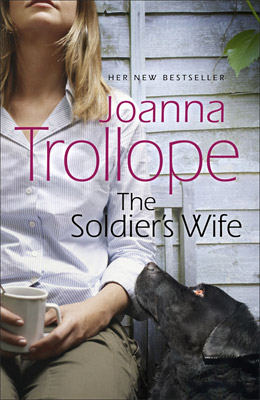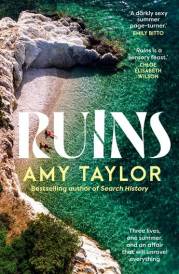The Soldier's Wife

The Soldier's Wife
Dan Riley is a major in the British Army. After a six month tour of duty in Afghanistan, he is coming home to the wife and young daughters he adores. The outside world sees those reunions as a taste of heaven after months of hell.
But are they? Can a man trained to fight adjust again to family and domestic life? And how will the family cope, if he can't? How much, indeed, can Alexa, Dan's wife, sacrifice her own needs and fulfilment to serve his commitment to a way of life that demands everything not just of him, but of her and the children as well?
This novel takes a keen look at the home lives of the modern Army. What happens, these days, when love and a vocation collide, head on?
Joanna Trollope has written several highly-acclaimed contemporary novels: The Choir, A Village Affair, A Passionate Man, The Rector's Wife, The Men And The Girls, A Spanish Lover, The Best Of Friends, Next Of Kin, Other People's Children, Marrying The Mistress, Girl From The South and Friday Nights. Other People's Children has been shown on BBC television as a major drama serial. Under the name of Caroline Harvey she writes romantic historical novels. She has also written a study of women in the British Empire, Britannia's Daughters.
Joanna Trollope was born in Gloucestershire and lives in London. She was appointed OBE in the 1996 Queen's Birthday Honours List for services to literature.
The Soldier's Wife
Random House Australia
Author: Joanna Trollope
ISBN: 9780385618045
Price: $32.95
Interview with Joanna Trollope
Question: When and where did the idea to write The Soldier's Wife, come?
Joanna Trollope: About 20 years ago, I wrote a novel called The Rector's Wife, about the dilemma of trying to be married to someone else's vocation. And I wanted to re-visit the situation, to see if anything had changed when a woman marries into a profession that has whole hearted public support, as our Armed Forces in the UK do right now. And this novel is the result...
Question: What research into the British Army, Army families and Army wives did you do for The Soldier's Wife?
Joanna Trollope: I did a lot of research. I had to get official clearance to be able to spend time - a lot of time! - with a British Artillery regiment, talking to men, and to officers, and to their wives and girlfriends and children. I even went on exercise with them - I've never seen men so dirty or so happy! And I also talked to a number of people with Army connections, or who had been in the Army. And I don't think I invented anything, for the novel.
Question: Can you talk about the difficulties in creating the character of Dan Riley?
Joanna Trollope: Once I understood how profoundly soldiers believe in what they are doing, and how brilliantly they do it, and what pride they take in doing it so well, as well as understanding their intense camaraderie, creating Dan wasn't difficult at all. All the soldiers I met had charm and manners - and all were as hard to really get through to...
Question: What did you enjoy most when creating the character of Alexa Riley?
Joanna Trollope: Alexa's challenge for me was to make her difficulties as real and painful as they undoubtedly are, in life, while not letting her seem too whiny. She also needed to be a good mother, a good wife, a sexy woman (soldiers are very keen on physical appearance!) a potential career woman, and, all the while, in the state of self-doubt and mild resentment that is familiar to most women these days...
Question: How do you think The Soldier's Wife will translate to an Australian audience?
Joanna Trollope: I think the situation will ring true for any woman who finds herself living with or married to, her partner's job, or even passionate hobby or sport. Whether the Australian public has a very different view of its Armed Forces I don't know, but even if the level of support isn't as strong as in the UK, there are plenty of parallels in civilian life to make the novel widely relevant.
Question: Have you always wanted to be a writer? What is your earliest memory of writing?
Joanna Trollope: I've always loved stories, and thought of them as the bedrock of our relationships, whether private or professional. I grew up without television remember, in the fifties and early sixties, so books were just the norm. I also always wanted to communicate, and I think that desire was paramount even before I found the way to do it.
Question: Can you talk about your writing process? Do you always know how the book will end when you begin?
Joanna Trollope: I share William Boyd's view that you shouldn't start a novel unless you know how it will end. My feeling is that you should, while writing, know where you are going, even if you don't know how you are going to get there. And yes, I am boringly disciplined while a book is on the go - I find I have to be, otherwise it never gets written. So I start in the morning, writing in longhand on A4 narrow ruled pads, and plough on until the early afternoon when I am usually too drained to continue - that feeling you used to have after a day of exams at school. Or, if it's gone badly, I'll stop and start again in the early evening, which seems to be a second-burst-of-energy time, for some reason...
Interview by Brooke Hunter
MORE



